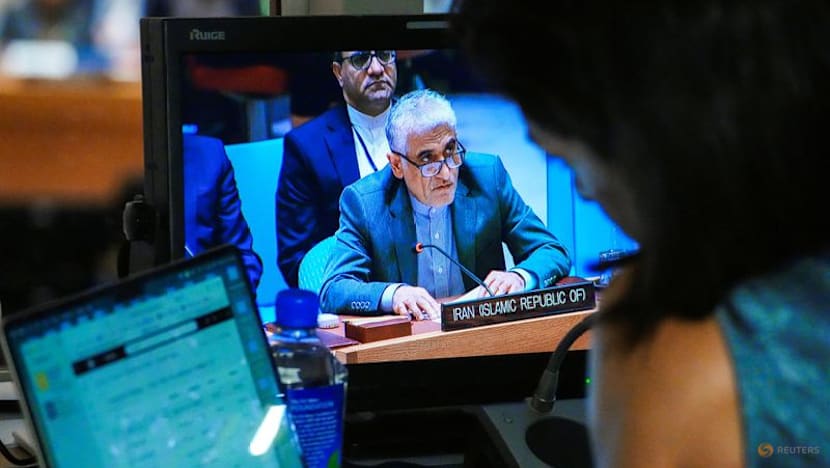UN Security Council votes to reimpose Iran nuclear sanctions

UNITED NATIONS: The UN Security Council voted on Friday (Sep 19) to reimpose wide economic sanctions on Iran over its resurgent nuclear programme, after pressure from European powers, drawing an angry response from Tehran.
Britain, France and Germany are signatories to the 2015 Joint Comprehensive Plan of Action, which was intended to prevent Tehran from obtaining nuclear weapons. The three governments say Iran has broken its commitments under the deal.
“We urge Iran to act now,” said Britain’s UN ambassador Barbara Woodward, as she voted against a resolution that would have extended the suspension of sanctions. She said the door remained open to diplomacy at next week’s UN General Assembly in New York.
Iran’s UN envoy, Amir Saeid Iravani, condemned the move as the “politics of coercion”. “Today’s action is hasty, unnecessary and unlawful. Iran recognises no obligation to implement it,” he told the Council.
Iranian Foreign Minister Abbas Araghchi said earlier on Friday that he had proposed a “fair and balanced” plan to European powers to avert the return of sanctions.
French President Emmanuel Macron said in an Israeli television interview before the vote that he expected sanctions to be restored by the end of the month. France’s UN ambassador said a negotiated outcome was still possible.
In a letter to the UN in mid August, the European three said Iran had breached several JCPOA commitments, including building a uranium stock more than forty times above the deal’s limit. They said a flurry of talks with Tehran had produced no progress.
ISRAEL WELCOMES COUNCIL MOVE
Israel, which opposed the 2015 deal, welcomed the decision. “The international community’s goal must remain unchanged, to prevent Iran from ever acquiring nuclear capabilities,” Israeli Foreign Minister Gideon Saar said on X.
Algeria, China, Pakistan and Russia opposed the Council action.
2015 DEAL IN TATTERS
Western powers and Israel have long accused Tehran of seeking nuclear weapons, a charge Iran denies. The 2015 accord has frayed since the United States withdrew in 2018 under then president Donald Trump and reimposed US sanctions.
After the US exit, Iran began stepping away from its commitments and expanded its nuclear activities. Tensions have risen further since the twelve day war between Iran and Israel in June, which derailed indirect nuclear talks between Tehran and Washington and led Iran to suspend cooperation with the International Atomic Energy Agency. IAEA inspectors left shortly after.
Iran late on Thursday withdrew a draft resolution at the IAEA that sought a ban on attacks against nuclear facilities following its war with Israel, citing US pressure.
In mid June, Israel launched an unprecedented bombing campaign against Iran, starting the war that included Israeli and US strikes on key Iranian nuclear sites, according to the AFP account.
During his previous term, Trump tried to trigger the JCPOA’s “snapback” mechanism in 2020 to restore UN sanctions. The attempt failed because Washington had already quit the deal in 2018.
European powers say they have clear legal grounds to trigger snapback. Iran disputes this and has threatened to withdraw from the Nuclear Non Proliferation Treaty if snapback is enforced.














